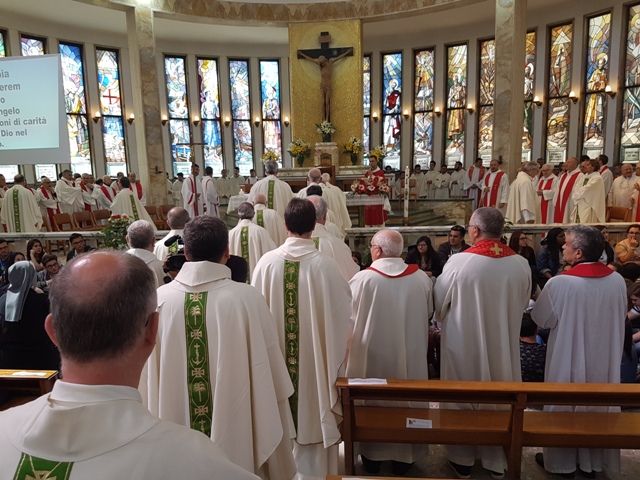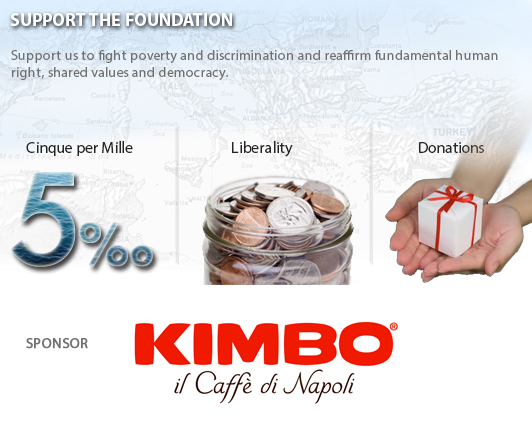|
25 April 2017

A group of Salesians from Foggia visiting the Museum and the emotional paths, in particular those of "Don Bosco, the power of love".
Particular emotion is the adoration of the relic of the "Saint of the Youth".
The majority were visiting the city of Naples for the first time and were stupid by 4K emotional videos!
In the end the choir of “’O sole mio!”.
|
25 April 2017

The Eucharistic Celebration was held in Naples on the occasion of the Meeting of the Salesian Movement of the IME.
He celebrated Don Pasquale Cristiani, Inspector of the IME, present delegations from southern Italy, Albania, Kosovo and Zurich.
On this occasion there were the Jubilee anniversaries and the Inspector Don Pasquale Cristiani was greeted at the end of his mandate.
The Eucharistic Celebration was held in Naples on the occasion of the Meeting of the Salesian Movement of the IME.
He celebrated Don Pasquale Cristiani, Inspector of the IME, present delegations from southern Italy, Albania, Kosovo and Zurich.
On this occasion there were the Jubilee anniversaries and the Inspector Don Pasquale Cristiani was greeted at the end of his mandate.
|
25 April 2017

A warm day of only 25 April, in a splendid natural setting such as the hermitage of San Biagio a Subiaco in the house of the Salesians of Don Bosco, was a splendid setting for the inter-religious dialogue on peace. Christian Buddhist and Hindu Muslim Jews gathered under the same roof. It was a day strongly desired and organized by this small community of San Biagio with the intelligent and generous collaboration of Stefania Terracciano and others, like her, lively Sanbiagini.
In the sudden spring explosion of "though born" leaflets and a jubilation of flowers, warmly welcomed by the local superior Sister Maria Letizia Gatti, Marco Cassuto Morselli, representative of the Jewish Community, Fatima Mohammad for the Muslims, Roberto Aushin Coslovi for the Buddhists and an envoy for the Hindus, as well as an envoy for the Hindus.
Peace "video clip, with the text music by Alessandro Docchi (Sanbiagino musician) creates the meditation: climate suitable to start the meeting.
Sister Maria Pia Giudici, representing the Christian religion, focused her work on a guiding idea of the meeting:"The path of truth of goodness and beauty can be identified as a way of the Spirit of God for every man of good will".
|
24 April 2017

The "Meeting of the Salesian Movement of the South Province" was held in Naples with delegations from southern Italy, Albania, Kosovo and Zurich.
On this occasion there were the Jubilee anniversaries and the Inspector Don Pasquale Cristiani was greeted at the end of his mandate.
|
24 April 2017

The event "In arte.... Totò" by Enzo Decaro and Liliana De Curtis took place at the National Archaeological Museum - as part of the "MANN Festival, Muse at the Museum": a journey into the poetic and musical world of Antonio De Curtis 50 years after his death.
Antonio De Curtis' voice enriched the union of words and music.
President Capasso attended the event, recalling with Elena De Curtis and Enzo Decaro the emotional path of the Museum of Peace and the extraordinary emotion of the poetry "A Livella" translated into Arabic.
|
24 April 2017

The event "In arte.... Totò" by Enzo Decaro and Liliana De Curtis took place at the National Archaeological Museum - as part of the "MANN Festival, Muse at the Museum": a journey into the poetic and musical world of Antonio De Curtis 50 years after his death.
Antonio De Curtis' voice enriched the union of words and music.
President Capasso attended the event, recalling with Elena De Curtis and Enzo Decaro the emotional path of the Museum of Peace and the extraordinary emotion of the poetry "A Livella" translated into Arabic.
|
22 April 2017

The "Med Festival Experience" takes place in Gaeta: a kermis dedicated to the field of boating, shipbuilding, logistics and harbour management promoted by the association Imprese Oggi, Consorzio Consormare del Golfo in collaboration with the Italian Confederation for Economic Development, COSIND - Consorzio per lo Sviluppo Industriale del Sud Pontino, and ASI - Consorzio per l' Area di Sviluppo Industriale della provincia di Napoli, with the sponsorship - among others - of the Fondazione Mediterraneo.
From Saturday 22nd April to Monday 1st May a real nautical village is set up: a rich calendar of events organized not only for insiders but also for simple lovers of the sea.
Over a week of events: not only exhibitions of the country's best sailing and shipbuilding shipyards, but also meetings, debates and entertainment with art exhibitions, live music and fashion.
An event that was created with the aim of promoting a very important supply chain for Gaeta and for the whole of South Pontine, relaunching a market that through the Mediterranean can enrich and intensify exchanges not only from an economic point of view, but above all from a cultural one.
The European Parliament President Antonio Tajani spoke at the inaugural ceremony.The European Parliament President Antonio Tajani spoke at the inaugural ceremony.
|
22 April 2017

Like every year, the Fondazione Mediterraneo and its partners have celebrated Earth Day: the largest environmental event on the planet, the only moment in which all the citizens of the world come together to celebrate the Earth and promote its protection.
The United Nations celebrate Earth Day every year, one month and two days after the spring equinox on 22 April.
This year, the Foundation wanted to act on an educational and informative level, especially addressing young people to underline the importance of respect for creation.
The events were held in Naples and Marrakech.
|
21 April 2017

From San Luca, a small village on the slopes of Aspromonte, a message of hope starts in the battle for legality and against crime with the initiative "In campo per il futuro", which represents the epilogue of an intense activity in schools in the province of Reggio Emilia continued throughout the year with meetings between students and magistrates and which took shape with the inauguration of the new stadium in the country. A symbolic gesture, of course, that represents a very precise signal, says undersecretary Boschi:"The state and the institutions are there, here in San Luca, and everywhere. There are no territories in which the State renounces to exist and to fight a battle of legality against the' ndrangheta".
A message that was taken up and repeated almost in chorus by all those who took part in the debate at a school in San Luca, which was a prologue to the inauguration of the football pitch with the match between the national singers and the magistrates (for the record won by the singers 4-3): to speak were the vice president of Csm Giovanni Legnini, the national anti-mafia prosecutor Franco Roberti, the secretary of Cei Nunzio Galantino, the prosecutors of Reggio Calabria and Catanzaro Federico Cafiero de Raho and Nicola Gratteri. Everyone agrees in emphasizing the constant presence of the team-state on the territory but also the need for collaboration of the population. "We are here today - it was the message to the boys - to say that things can change, even in San Luca. We want to build a different country, but to do so we need you.
Many representatives of the "Federation Anna Lindh Italy" participants. President Capasso emphasized the role played by OMCOM (the Mediterranean Observatory on organized crime and mafias set up by the Caponnetto Foundation) and the message of Nino Caponnetto, which underlined that "the mafia is more about culture than justice". Hence the important role of schools in helping young people to fight the mafias,"cancer that corrodes the future".
STUDENTS OF THE "MARIO PERRONE" HIGHER EDUCATION INSTITUTE OF CASTELLANETA ASSISTE TO THE PROJECTION OF THE FILM ON "MARIA PIA GIUDICI".
|
19 April 2017
 Students of the "Mario Perrone" Institute of Higher Education in Castellaneta attended the screening of the film "Maria Pia Giudici" in the cinema hall of the Museum of Peace.
Students of the "Mario Perrone" Institute of Higher Education in Castellaneta attended the screening of the film "Maria Pia Giudici" in the cinema hall of the Museum of Peace.
More Articles ...
- STUDENTS OF THE "MARIO PERRONE" HIGHER EDUCATION INSTITUTE OF CASTELLANETA VISITING THE TOTEM OF PEACE OF MOLINARI
- STUDENTS OF THE "MARIO PERRONE" HIGHER EDUCATION INSTITUTE OF CASTELLANETA VISITING THE MOSQUE OF THE MUSEUM OF PEACE
- STUDENTS AT THE "MARIO PERRONE" HIGHER EDUCATION INSTITUTE OF CASTELLANETA VISITING THE MUSEUM OF PEACE
- A GIFT FOR THE MUSICAL ROOM OF THE MUSEUM

































